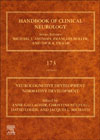
Neurocognitive Development: Normative Development
Gallagher, Anne
Bulteau, Christine
Cohen, David
Michaud, Jacques
This is one of a two volume work on neurocognitive development, focusing separately on normative and non-normative development. The normative volume focuses on neurology, biology, genetics, and psychology of normative cognitive development. It covers the development of intellectual abilities, visual perception, motor function, language, memory, attention, executive function, social cognition, learning abilities, and affect and behavior. The book identifies when and how these functions develop, the genetics and neurophysiology of their operation, and their evaluation and assessment in clinical practice. This book will serve as a comprehensive reference to researchers in cognitive development in neuroscience, psychology, and medicine, as well as to clinicians and allied health professionals focused on developmental disabilities (child neurologists, pediatric neuropsychologists, child psychiatrists, speech and language therapists, and occupational therapists.) Summarizes research on normative neurocognitive developmentIncludes intellectual abilities, language, memory, attention, motor function, and moreDiscusses genetics and environmental influences on developmentProvides interdisciplinary information of use to both researchers and clinicians INDICE: Part 1: General Introduction to Factors Affecting Neurocognitive Development 1. Description and Classifications (Anne Gallagher, University of Montreal, Canada; or other) 2. Historical overview (Bernard Crespi, Simon Fraser University, British Columbia, Canada) 3. Ethical views and considerations (Olivier Houde, Université de Paris Descartes, France) 4. Socio-cultural and environmental factors (family, SES, political context, etc.) 5. Quality of life of children and families (Mary Lou Smith, University Toronto, Canada) Part 2: Scientific Basis of Neurocognitive Development 1. The Point of View of a Developmental Neurobiologist (Ben Ari, INMED Marseille) Synaptogenesis in mammals, neurotransmission 2. The Point of View of a Geneticist (Odile Boespflug-Tanguy, Paris) Development of the central nervous system and genetics 3. The Point of View of a Child Neuropsychologist (Anne Gallagher, University of Montreal) Developmental sequences of cognitive functions 4. The Point of View of a Pediatric Neurologist (Christine Bulteau, Paris) Specific developmental disorders 5. The Point of View of a Child Psychiatrist (D Marcelli) transitional or long-term disorders, development of mental health disorders Part 3: Theoretical Models of Neurocognitive Development 1. Hemispheric Specialization (Alberto Galaburda, Harvard, USA) 1- The concept of equipotentiality 2- Early hemispheric specialization model 3- Reliability of cerebral lateralization in the development 2. Vulnerability of Immature Brain (Vicky Anderson, Melbourne, Australia) 1- Definition and theoretical concepts 2- . 3. Early Brain Plasticity (FY Ismail and MV Johnston, John Hopkins University, USA) 1- Definition and theoretical concepts 2- . 4. The Concept of Resilience (Giovanni Cioni University, Pise, Italy) 5. Critical Periods of Brain Development (Vision.) (Helen Neville, University of Oregon, USA) 6. The Role of Cerebellum in Neuropsychological Functioning (D Riva, Institute Carlo Besta, Milan, Italy) Part 4: Typical Functional Neurocognitive Development 1. Intellectual Abilities (TBD) 1- Definition of Intelligence 2- Typical development of intellectual capacity 3- Evaluation of intellectual abilities 2. Visual Perception (Gnosies) (Janette Atkinson, University College London UK; Eliza Fazzi University of Brescia Italie; paolo Emilio Bianchi University of Pavia, Italy) 1. Role of the vision in early brain development 2. Visual pathway development in childhood 3. Assessment of visual perception abilities in childhood 3. Motor Functions (Carole Richards, Laval University, physio; Maurice Ptito, McGill and Danish Research Center) 1- Definition of motor function and praxis 2- Typical development of motor / praxis abilities 3- Evaluation of motor function and praxis in children 4. Language Development in Childhood (including pragmatic) (Stella de Bode, UCLA; Judith Gervain, Univ. Paris Descartes) 1. Definition of language function: evolution and concept 2. Typical development of language 3. Evaluation of language function in children 5.Neuroscientific Basis of Language Development (Ghislaine Dehaene, CNRS, Paris; Janet Werker, University of British Columbia) 6. Written Language - Reading (Pr Maggie Snowling, Saint Joseph's college Oxford; Pr Charles Hulme, University College London, UK) 7. Written Language - Handwriting (Pr Loncamp, UMR7291 CNRS, Aix-Marseille, Université de France) 8.Memory (Marion Noulhiane, Neurospin, AND Yadin Dudai Wiezmann Institute, Israel) 1- Definition of memory 2- Neurobiology of memory 3- Development of memory in children and relationship with the other cognitive functions 4- neuroscientific basis of memory development in children 5- Evaluation of memory in children 9. Attention (TBD) 1- Definition of Attention 2- Development of attention capacities in children 3- Evaluation of attention in children 10. Executive Function (Adele Diamond, University of British Columbia; Arnaud Roy, Nantes) 11. Social Cognition (Miriam Beauchamp, Université de Montréal) 12. Learning Abilities (Sarah Lippé, Université de Montréal) 13. Affect and Behavior (à voir avec un pédopsychiatre Pr David Cohen) 1. Neuroscientific basis of behavioral development: impact of new concept such as mirror neurons, Empathy. 2. Evaluation of behavior in children
- ISBN: 978-0-444-64150-2
- Editorial: Elsevier
- Encuadernacion: Cartoné
- Páginas: 557
- Fecha Publicación: 01/10/2020
- Nº Volúmenes: 1
- Idioma: Inglés
